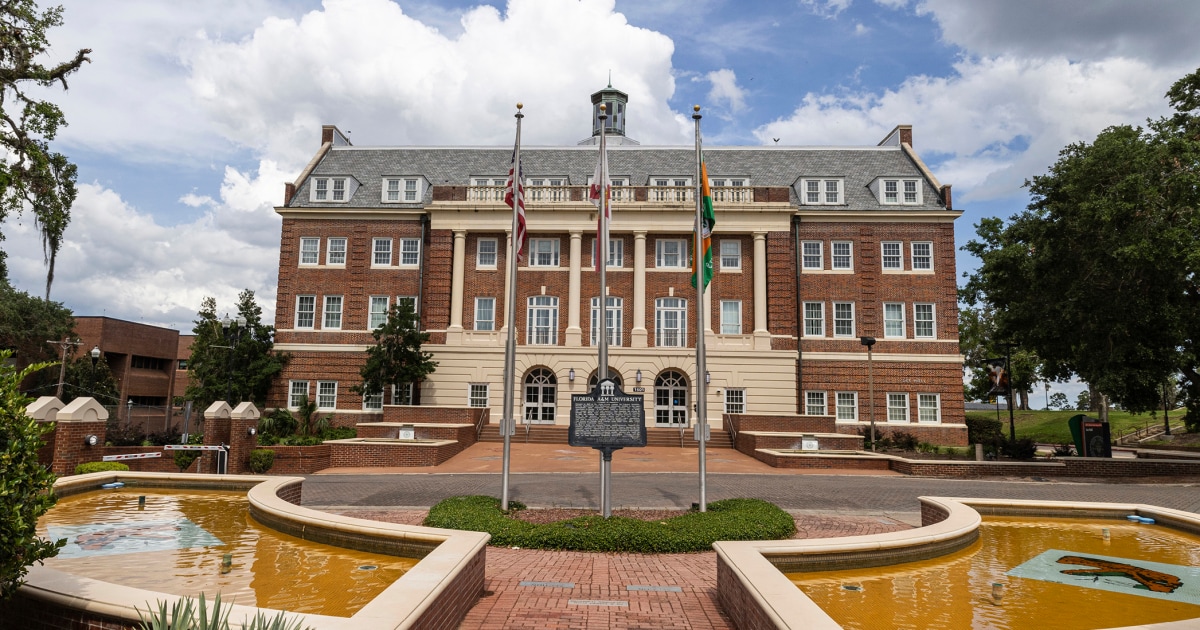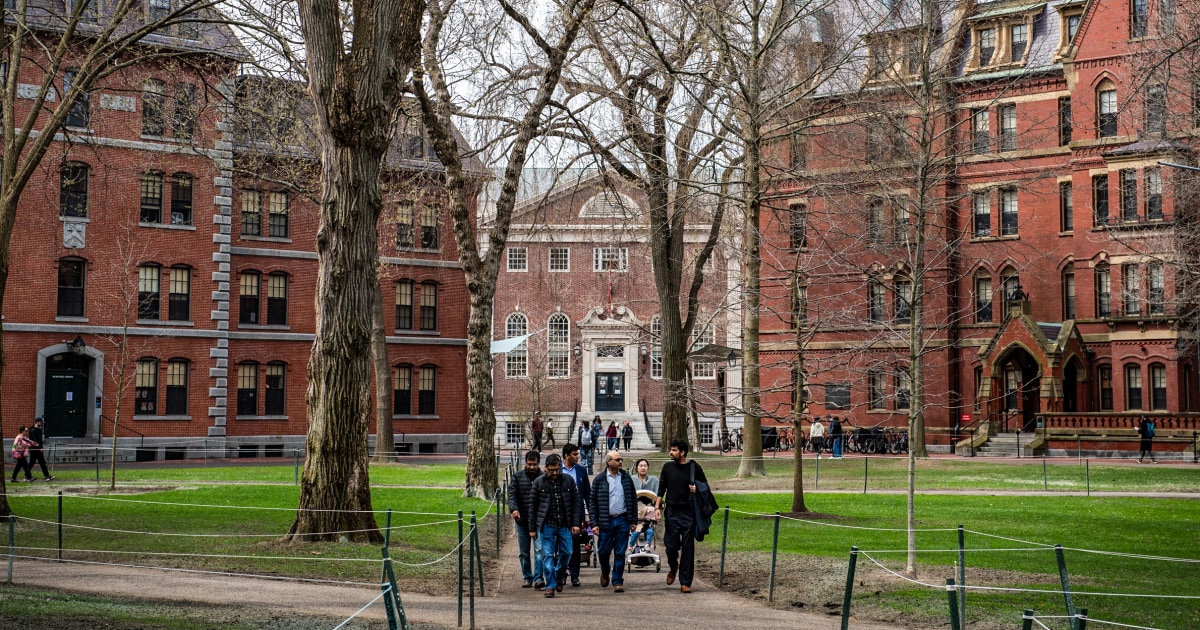Education
Many HBCUs need government funding but some are preparing for a future without it

Colleges across the country are facing battles with the federal government over funding, but similar cuts and the potential elimination of the Education Department may be existential for historically Black colleges and universities, according to at least six college administrators and leaders who spoke with NBC News.
Florida Agricultural and Mechanical University’s (FAMU) college of pharmacy lost a $16.3 million federal grant in late March, as the Trump administration has threatened cuts at American colleges over diversity, equity and inclusion on campus. The moves are causing several Black colleges to consider what their budgets may look like with less or no federal funding.
“We’re at this position where we realize that our ancestors did not rely on federal money in order to get the work done,” said Fatima Brunson, an assistant professor for education at Spelman College, a private women’s HBCU in Atlanta with about 2,600 students.
Still, for the 100 or so HBCUs in the country — some of which were underfunded by more than $12 billion over the last 30 years compared with non-HBCUs, according to a 2022 Forbes analysis — federal cuts may translate to staff cuts, fewer students and the elimination of certain programs, according to two HBCU administrators who spoke to NBC News on the condition of anonymity because they were not authorized to speak on behalf of their universities.
One of the HBCU leaders described a shared “culture of concern” across Black colleges.
“Students and others at these institutions are getting a steady and really unmistakable message that they are the enemies of the Trump administration at all levels,” the HBCU leader said. “If there is a hiccup there, then we are going to get a stomach ulcer.”
Fifty-four percent of Black colleges’ total revenue depends on federal and state funds, compared with just one-third for other colleges and universities, making them “susceptible to economic downturns, state divestments from higher education, or policy changes,” the authors of a 2019 report by the United Negro College Fund wrote.
The dilemma has fueled angst at these institutions — where, on average, 3 in 4 students also receive need-based federal aid — about who will have access to financial resources and benefits and who won’t. Seventy-three percent of HBCU students receive Pell Grants, the low-income federal student aid program, which were traditionally issued by the Education Department, compared with 36% of non-HBCU students, according to the United Negro College Fund.
The White House did not respond to a request for comment. Madi Biedermann, the Education Department’s deputy assistant secretary for communications, said the department will not be shutting down immediately, and that federally mandated programs have not been moved out of the Education Department as of now.
“As President Trump and Secretary McMahon have made clear, sunsetting the Department of Education will be done in partnership with Congress and national and state leaders to ensure all statutorily required programs are managed responsibly and where they best serve students and families,” Biedermann said in a statement to NBC News on Wednesday.
Valerie Kinloch, who became president of Johnson C. Smith University in Charlotte, North Carolina, less than two years ago, expected challenges in her position. She did not anticipate having to weather the eventual dismantling of the Education Department or preparing to reimagine university life without federal funds.
“And yet,” she said, “we are.”
Kinloch’s predicament mirrors what many Black colleges and universities are experiencing as they brace for potential staffing cuts and reduced student enrollment as the Education Department heads toward being shuttered by the Trump administration.
To make up for a potential shortfall, her university launched a $10 million fundraising initiative to match the amount of federal aid it receives.
Kinloch noted that while some financial responsibilities for colleges also fall to states, she is concerned about the future of federal programs like Upward Bound, which helps first-generation college students and is backed by the Education Department.
Grant funding for critical health and science research, including several ongoing projects that address housing and health care inequalities “that can transform lives,” she said, may also be in danger due to cuts.
Black colleges contribute roughly $15 billion to their local economies in addition to tens of thousands of jobs, according to the Thurgood Marshall College Fund.
For example, FAMU’s lost $16.3 million federal grant supported new faculty hires and funded research into artificial intelligence and cancer biology, including colorectal cancer disparities in Black Americans. The school is now appealing the decision to the National Institutes of Health, an agency under the Department of Health and Human Services.
No further cuts have come down yet, but Charles Weatherford, vice president for research at FAMU, said that “the loss of funding from the Department of Education could potentially impact funds that have been used to support graduate students and academic departmental innovation. Less funding opportunities would impact the types of financial support available to students to further their higher education aspirations.”
With cuts, new federal restrictions and confusion looming over colleges, some HBCU leaders say their colleges are exploring what life without government funding would look like — while acknowledging that not every campus has that privilege.
More than 300,000 students attend about 100 accredited HBCUs across 19 states, according to the National Center for Education Statistics.
North Carolina A&T, the biggest HBCU, has the largest endowment of all Black public colleges, with $202 million in its coffers. Howard University, a private school in Washington, D.C., recently became the first Black college to have a $1 billion endowment.
“As an institution and HBCU, Spelman College has positioned themselves to feel pretty confident that we’re OK,” said Spelman’s Brunson. “But it’s not the same” for each HBCU.
Eighteen Black colleges, including Howard, were among the 30 most reliant on federal funds for their operating revenues, according to 2023 federal education data.
Hassiem Kambui, an education professor at a public HBCU and author of “Africentric Education: Public Schools Versus Charter Schools,” said he sees this time of evolution for Black colleges as a moment to reinvest in self-preservation.
“This is an opportunity to look at ourselves as educators and evaluate how we are moving on education, focusing on change and the lessons we can learn associated with how American students are served given those allocated funds,” Kambui said.
President Donald Trump has threatened to pull federal funding from colleges that don’t rid their curriculums and offices of DEI-related materials and practices, even investigating 45 universities that have partnered with The PhD Project, which aims to diversify faculties at business schools. While no HBCUs are among those listed, HBCU leaders anticipate that it’s only a matter of time.
By banning DEI practices in the federal government and putting pressure on private companies to do the same, Trump has prophesied, “Our country will be woke no longer.” This comes as HBCUs are experiencing record enrollment numbers following the Supreme Court’s 2023 decision to strike down affirmative action programs and race-based admissions at predominantly white institutions.
In February, the U.S. Department of Agriculture briefly suspended its 1890 scholars program, an initiative at 19 HBCUs that covers the full tuition of selected agricultural studies students. The program was restored four days later, and the federal government did not explain why it had been initially suspended.
Many HBCU leaders see consistent roadblocks for Black schools as evidence of a coordinated strategy at the highest levels of the country to undermine their existence.
Brunson, said she sees this moment as an opportunity to reset.
“Education is under attack and it’s just something that we’re kind of in the trenches with,” she said. “If anything, it’s making us go back to the deeper philosophical reason for why we are here in the first place.”
Education
Judge orders detained Tufts student Rumeysa Öztürk to be transferred back to Vermont

A federal judge on Friday ordered that the Tufts University student who wrote an essay about Israel and the war in Gaza and is now fighting deportation must be transferred back to Vermont.
Judge William K. Sessions III stayed his order for four days to give the government a chance to appeal.
Rumeysa Öztürk, a 30-year-old Turkish national in the United States on a visa, is being held at an Immigration and Customs Enforcement detention center in Louisiana.
In Friday’s ruling, the judge refused efforts by the government to dismiss her habeas petition.
He found that Öztürk “has raised significant constitutional concerns with her arrest and detention.”
The Tufts doctoral student was arrested March 25 in Somerville, Massachusetts, and the Department of Homeland Security has accused her of engaging “in activities in support of Hamas.”
She co-wrote an opinion essay in 2024 for the student newspaper that called on Tufts to “acknowledge the Palestinian genocide,” which the undergraduate student government had demanded in a resolution.
The essay criticized university leadership for its response to the student government’s resolutions that it “disclose its investments and divest from companies with direct or indirect ties to Israel.”
“A university op-ed advocating for human rights and freedom for the Palestinian people should not lead to imprisonment,” one of her attorneys, Mahsa Khanbabai, said Friday. “Our immigration laws should not be manipulated to rip people away from their homes and their loved ones.”
Öztürk’s attorneys called Friday’s ruling a victory, and said that the federal government was trying to manipulate where her case would be heard so that it could try for its preferred outcome.
Friday’s ruling allows Öztürk to remain in ICE custody in Vermont while her habeas petition, which challenges her detainment, proceeds in federal court, as well as her removal case in immigration court in Louisiana.
The Department of Justice declined to comment Friday.
Öztürk is one of a number of international students in the U.S. on visas who the Trump administration is trying to deport for their actions protesting the conduct of Israel in its war against Hamas in Gaza, which it launched after the Hamas attacks on Israel on Oct. 7, 2023.
Tufts University has defended Öztürk and has petitioned that she be released from custody. The university said the opinion essay did not violate its policies and was in accordance with its position on free speech.
“The University has no further information suggesting that she has acted in a manner that would constitute a violation of the University’s understanding of the Immigration and Naturalization Act,” the university leadership said in a declaration earlier this month.
Education
Harvard’s battle with the Trump administration is creating a thorny financial situation

Harvard’s brewing conflict with the Trump administration could come at a steep cost — even for the nation’s richest university.
On April 14, Harvard University President Alan Garber announced the institution would not comply with the administration’s demands, including to “audit” Harvard’s students and faculty for “viewpoint diversity.” The federal government, in response, froze $2.2 billion in multi-year grants and $60 million in multi-year contracts with the university.
According to CNN and multiple other news outlets, the Trump administration has now asked the Internal Revenue Service to revoke Harvard’s tax-exempt status. If the IRS follows through, it would have severe consequences for the university. The many benefits of nonprofit status include tax-free income on investments and tax deductions for donors, education historian Bruce Kimball told CNBC.
Bloomberg estimated the value of Harvard’s tax benefits in excess of $465 million in 2023.
Nonprofits can lose their tax exemptions if the IRS determines they are engaging in political campaign activity or earning too much income from unrelated activities. Few universities have lost their non-profit status. One of the few examples was Christian institution Bob Jones University, which lost its tax exemption in 1983 for racially discriminatory policies.
White House spokesperson Harrison Fields told the Washington Post that the IRS started investigating Harvard before President Donald Trump suggested on Truth Social that the university should be taxed as a “political entity.” The Treasury Department did not reply to a request for comment from CNBC.
A Harvard spokesperson told CNBC that the government has “no legal basis to rescind Harvard’s tax exempt status.”
“The government has long exempted universities from taxes in order to support their educational mission,” the spokesperson wrote in a statement. “Such an unprecedented action would endanger our ability to carry out our educational mission. It would result in diminished financial aid for students, abandonment of critical medical research programs, and lost opportunities for innovation. The unlawful use of this instrument more broadly would have grave consequences for the future of higher education in America.”
The federal government has challenged Harvard on yet another front, with the Department of Homeland Security threatening to stop international students from enrolling. The Student and Exchange Visitor Program is administered by Immigration and Customs Enforcement, which falls under the DHS.
International students make up more than a quarter of Harvard’s student body. However, Harvard is less financially dependent on international students than many other U.S. universities as it already offers need-based financial aid to international students in its undergraduate program. Many other universities require international students to pay full tuition.
The Harvard spokesperson declined to comment to CNBC on whether the university would sue the administration over the federal funds or any other grounds. Lawyers Robert Hur of King & Spalding and William Burck of Quinn Emanuel are representing Harvard, stating in a letter to the federal government that its demands violate the First Amendment.
Harvard, the nation’s richest university, has more resources than other academic institutions to fund a long legal battle and weather the storm. However, its massive endowment — which has raised questions during the recent developments — is not a piggy bank.
Why Harvard’s endowment is so large
Harvard has an endowment of nearly $52 billion, averaging $2.1 million in endowed funds per student, according to a study by the National Association of College and University Business Officers, or NACUBO, and asset manager Commonfund.
That size makes it larger than than the GDP of many countries.
The endowment generated a 9.6% return last fiscal year, which ended June 30, according to the university’s latest annual report.
Founded in 1636, Harvard has had more time to accumulate assets as the nation’s oldest university. It also has robust donor base, receiving $368 million in gifts to the endowment in 2024. While the university noted that more than three-quarters of the gifts averaged $150 per donor, Harvard has a history of headline-making donations from ultra-rich alumni.
Kimball, emeritus professor of philosophy and history of education at the Ohio State University, attributes the outsized wealth of elite universities like Harvard to a willingness to invest in riskier assets.
University endowments were traditionally invested very conservatively, but in the early 1950s Harvard shifted its allocation to 60% equities and 40% bonds, taking on more risk and creating the opportunity for more upside.
“Universities that didn’t want to assume the risk fell behind,” Kimball told CNBC in March.
Other universities soon followed suit, with Yale University in the 1990s pioneering what would become the “Yale Model” of investing in alternative assets like hedge funds and natural resources. Though it proved lucrative, only universities with large endowments could afford to take on the risk and due diligence that was needed to succeed in alternative investments, according to Kimball.
According to Harvard’s annual report, the largest chunks of the endowment are allocated to private equity (39%) and hedge funds (32%). Public equities constitute another 14% while real estate and bonds/TIPs make up 5% each. The remainder is divided between cash and other real assets, including natural resources.
The university has made substantial portfolio allocation changes over the past seven years, the report notes. The Harvard Management Company has cut the endowment’s exposure to real estate and natural resources from 25% in 2018 to 6%. These cuts allowed the university to increase its private equity allocation. To limit equity exposure, the endowment has upped its hedge fund investments.
The endowment is not a piggy bank
University endowments, though occasionally staggering in size, are not slush funds. The pools are actually made up of hundreds or even thousands of smaller funds, the majority of which are restricted by donors to be dedicated to areas including professorships, scholarships or research.
Harvard has some 14,600 separate funds, 80% of which are restricted to specific purposes including financial aid and professorships. Last fiscal year, the endowment distributed $2.4 billion, 70% of which was subject to donors’ directives.
“Most of that money was put in for a specific purpose,” Scott Bok, former chairman of the University of Pennsylvania, told CNBC in March. “Universities don’t have the ability to break open the proverbial piggy bank and just grab the money in whatever way they want.”
Some of these restrictions are overplayed, according to former Northwestern University President Morton Schapiro.
“It’s true that a lot of money is restricted, but it’s restricted to things you’re going to spend on already like need-based aid, study abroad, libraries,” Bok said previously.
How Harvard is shoring up its finances
Harvard has $9.6 billion in endowed funds that are not subject to donor restrictions. The annual report notes that “while the University has no intention of doing so,” these assets “could be liquidated in the event of an unexpected disruption” under certain conditions.
Liquidating $9.6 billion in assets, nearly 20% of total endowed funds, would come at the cost of future cash flow, as the university would have less to invest.
Harvard did not respond to CNBC’s queries about increasing endowment spending. Like most universities, it aims to spend around 5% of its endowment every year. Assuming the fund generates high-single-digit investment returns, spending just 5% allows the principal to grow and keep pace with inflation.
For now, Harvard is taking a hard look at its operating budget. In mid-March, the university started taking austerity measures, including a temporary hiring pause and denying admission to graduate students waitlisted for this upcoming fall.
Harvard is also issuing $750 million in taxable bonds due September 2035. This past February, the university issued $244 million in tax-exempt bonds. A slew of universities including Princeton and Colgate are also raising debt this spring.
So far, Moody’s has not updated its top-tier AAA rating for Harvard’s bonds. However, when it comes to higher education as a whole, the ratings agency isn’t so optimistic, lowering its outlook to negative in March.
Education
Trump admin threatens to stop Harvard from enrolling foreign students

The Trump administration is continuing its battle against Harvard University — this time, canceling $2.7 million in grants and threatening to stop the enrollment of international students.
Homeland Security Secretary Kristi Noem on Wednesday announced the cancellation of two DHS grants to the school, declaring it “unfit to be entrusted with taxpayer dollars.”
Noem also said she sent a letter to Harvard demanding “detailed records” on foreign student visa holders’ “illegal and violent activities” by April 30.
If Harvard does not meet that deadline, it’ll immediately lose its Student and Exchange Visitor Program certification, she warned.
The release alleged Harvard’s foreign visa holders participated in riots and spewed antisemitic hate targeting Jewish students following the Hamas incursion against Israel on Oct. 7, 2023.
“If Harvard cannot verify it is in full compliance with its reporting requirements, the university will lose the privilege of enrolling foreign students,” a DHS news release said.
The two canceled grants were: an $800,303 grant for Implementation Science for Targeted Violence Prevention, which Noem said “branded conservatives as far-right dissidents in a shockingly skewed study,” and a $1.9 million Blue Campaign Program Evaluation and Violence Advisement grant that Noem alleged “funded Harvard’s public health propaganda.”
“Harvard bending the knee to antisemitism — driven by its spineless leadership — fuels a cesspool of extremist riots and threatens our national security,” Noem said in a statement. “With anti-American, pro-Hamas ideology poisoning its campus and classrooms, Harvard’s position as a top institution of higher learning is a distant memory. America demands more from universities entrusted with taxpayer dollars.”
It’s the latest punch by the Trump administration against the nation’s most prestigious university.
Earlier this week, the Trump administration announced that it would freeze more than $2 billion in grants to Harvard after the institution refused to accept demands that included auditing the viewpoints of its student body. Trump has also called for Harvard to lose its tax-exempt status.
On Monday, Harvard University’s lawyers sent a letter rejecting a list of demands from the Trump administration. In a statement posted online, Harvard President Alan Garber referred to the demands as “an attempt to control the Harvard community” and vowed to fight back.
A Harvard spokesperson told NBC News on Thursday that the school will “not surrender its independence or relinquish its constitutional rights,” while complying with the law.
-

 Education1 day ago
Education1 day agoHarvard’s battle with the Trump administration is creating a thorny financial situation
-

 Lifestyle2 days ago
Lifestyle2 days agoThousands of pilgrims trek through New Mexico desert to historic adobe church for Good Friday
-

 Lifestyle1 day ago
Lifestyle1 day agoSweets from the sky! A helicopter marshmallow drop thrills kids in suburban Detroit
-

 Sports2 days ago
Sports2 days agoAaron Rodgers ‘not holding anybody hostage’ as he decides his future, retirement a possibility
-

 Sports2 days ago
Sports2 days agoManchester United pulls off ‘miracle’ Europa League victory against Lyon
-

 Africa2 days ago
Africa2 days agoTrump administration plans to shut down nearly 30 U.S. embassies — over half in Africa
-

 Lifestyle2 days ago
Lifestyle2 days agoFans of Superman relate to comic’s religious and ethical themes
-

 Europe2 days ago
Europe2 days agoLive updates: Trump news, Ukraine peace talks, US immigration, tariffs and university funding




